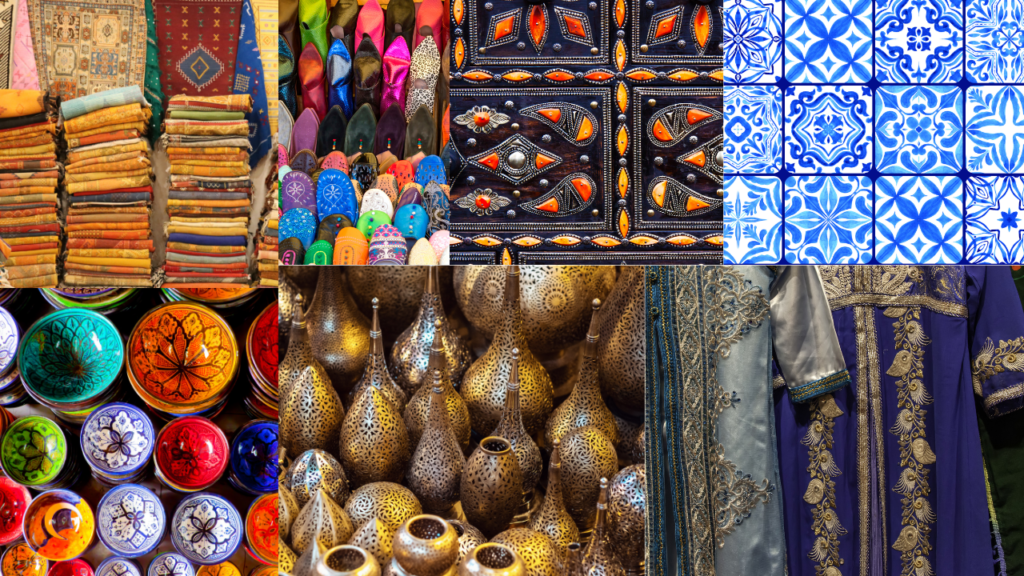Uncategorized
Moroccan Handmade Products: Authentic Crafts and Artistry
Introduction to Moroccan Handmade Products
Morocco is renowned for its rich tradition of handicrafts, which showcase the exceptional artistry and craftsmanship of its skilled artisans. From pottery and ceramics to textiles and leather goods, Moroccan handmade products encompass a diverse range of materials and techniques. These items hold immense importance in Moroccan culture, reflecting the country’s heritage and traditions.
The Rich Tradition of Moroccan Handicrafts
Moroccan handicrafts have a long-standing history rooted in centuries-old traditions. Passed down from generation to generation, these crafts showcase the legacy of Moroccan artisans who have dedicated their lives to honing their skills. Each piece tells a story, preserving the cultural heritage of the country and captivating the imagination of those who appreciate the artistry.
Diverse Range of Materials and Techniques Used
Moroccan artisans exhibit their versatility through the use of a wide range of materials and techniques. From intricate zellige mosaic work to beautiful hand-painted ceramics, each craft is unique and requires a mastery of specialized skills. Artisans utilize locally sourced materials such as clay, wood, leather, and metal, transforming them into exquisite creations through their meticulous craftsmanship.
Importance of Handmade Products in Moroccan Culture
Handmade products occupy a significant place in Moroccan culture, embodying the values and traditions of the country. These products are not merely decorative pieces; they hold symbolic meaning and serve practical purposes in daily life. From traditional pottery used for cooking and serving meals to textiles that adorn homes and clothing, handmade products play an integral role in Moroccan customs and rituals.
Economic and Social Significance
Moroccan handmade products contribute to the local economy and provide substantial employment opportunities for artisans and their communities. By purchasing these products, consumers support sustainable livelihoods and help preserve traditional skills and knowledge.
Contribution to Local Economy and Employment
The demand for Moroccan handmade products on a global scale has a direct positive impact on the local economy. The production and sale of these products generate income for artisans, their families, and the wider community. Artisan cooperatives, which operate as social enterprises, ensure fair wages and empower individuals by providing them with stable sources of income.
Preservation of Traditional Skills and Knowledge
The production of Moroccan handmade products serves as a means of preserving traditional skills and knowledge that have been passed down through generations. By engaging in these crafts, artisans keep ancient techniques alive and prevent them from being lost to modernization. This preservation of cultural heritage safeguards the rich history and traditions that make Moroccan handicrafts so unique.
Empowering Artisans and Communities
The sale of Moroccan handmade products directly empowers artisans and their communities. Craftsmen and craftswomen gain recognition and pride in their work, as their creations receive appreciation both locally and internationally. The increased economic stability and social recognition empower artisans to continue practicing their crafts and pass on their knowledge to future generations.
Rising Global Demand for Moroccan Handmade Products
The global appreciation for Moroccan handmade products has been on the rise in recent years due to a growing interest in authentic and sustainable products. Morocco’s unique design aesthetic, influenced by diverse cultural influences, has captivated individuals around the world. By supporting local artisans through ethical consumption, consumers contribute to the preservation of traditional crafts and make a positive impact on communities.
Growing Appreciation for Authentic and Sustainable Products
In an era dominated by mass production and impersonal goods, there is a growing appreciation for the authenticity and sustainability offered by handmade products. Moroccan handmade items are often created with natural materials and sustainable practices, aligning with the values of conscious consumers. The uniqueness and personal touch of each piece add value and meaning to the lives of those who choose these one-of-a-kind creations.
Influence of Moroccan Design and Aesthetics Worldwide
Moroccan design and aesthetics have left an indelible mark on the global stage. From vibrant colors to intricate patterns, Moroccan influence can be seen in art, fashion, and interior design. The allure of Moroccan handmade products lies in their ability to transport individuals into a world of richness and beauty. Consumers seek to infuse their own spaces and lives with the enchanting aura of Moroccan design.
Supporting Local Artisans through Ethical Consumption
Ethical consumption is a powerful way for consumers to support local artisans and ensure the continuation of traditional crafts. By purchasing Moroccan handmade products from fair trade organizations and artisan cooperatives, individuals create a direct link between themselves and the artisans who pour their passion into every creation. This conscious choice positively impacts the lives of artisans, their families, and their communities.
Exploring Moroccan Handmade Home Decor
Moroccan handmade products form a mesmerizing collection of home decor items that can transform any living space into an oasis of beauty and cultural appreciation. From intricate pottery and ceramics to exquisite textiles and enchanting lighting, these pieces add a touch of Moroccan charm to any home.
Intricate Pottery and Ceramics
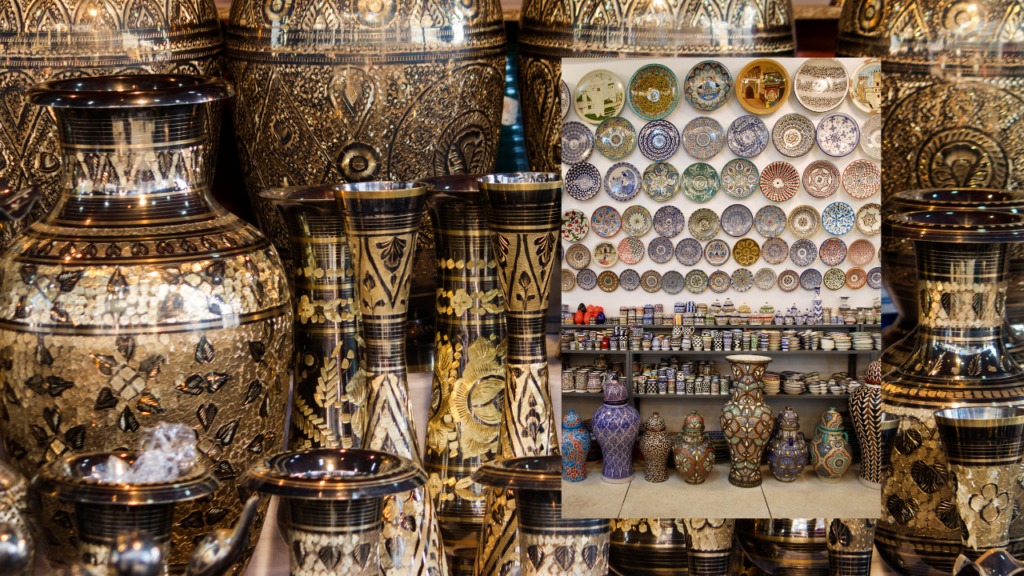
Moroccan pottery and ceramics are renowned for their unique designs and patterns. Each piece showcases the skilled craftsmanship of Moroccan artisans and tells a story through its intricate details. Traditional techniques such as hand-painting, intricate glazing, and zellige mosaic work are used to create these stunning pieces. Symbolism plays a vital role, with motifs representing fertility, protection, and prosperity.
Exquisite Textiles and Carpets
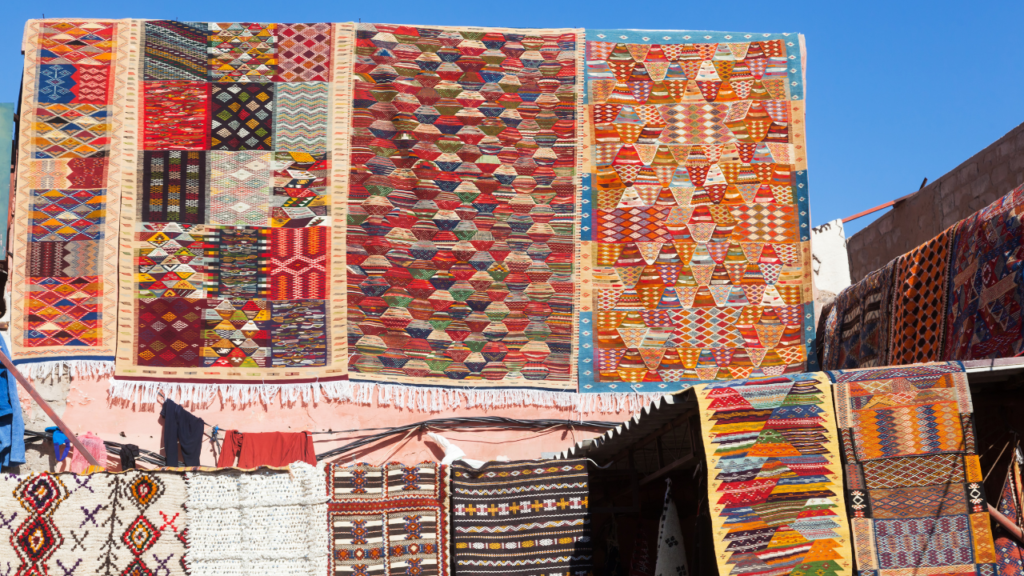
Moroccan textiles and carpets are a feast for the eyes, offering vibrant colors and mesmerizing patterns. These artisanal creations are born from traditional weaving methods passed down through generations. Each textile and carpet represents a labor of love, reflecting the intricacy and skills of Moroccan artisans. These pieces add warmth, style, and a sense of cultural heritage to any home.
Enchanting Moroccan Lighting
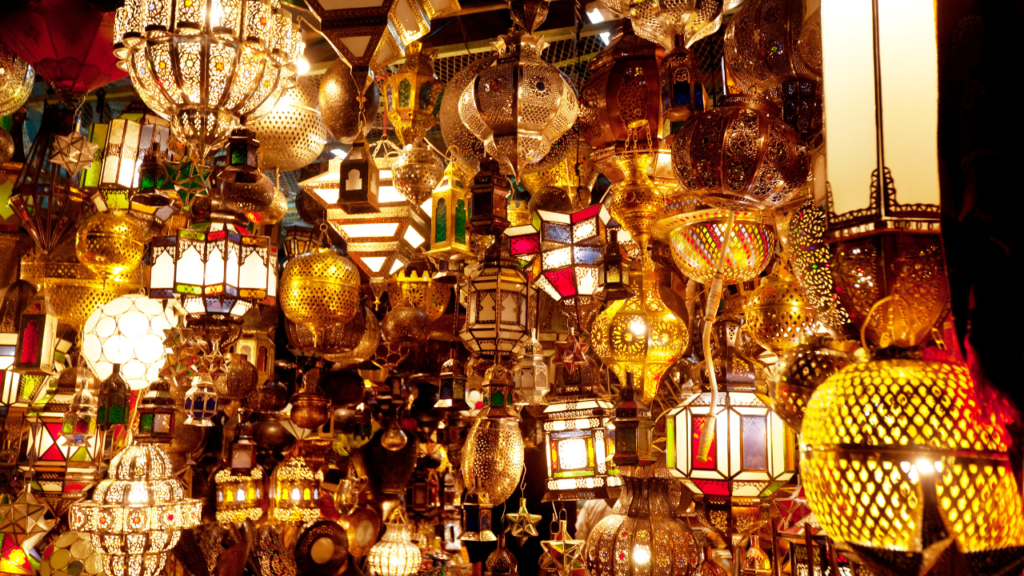
Moroccan lighting holds a special place in the world of home decor. Moroccan lanterns, with their delicate charm and captivating designs, cast a captivating glow, creating an ambiance of warmth and serenity in any space. Mosaic lamps, adorned with colorful glass elements, bring a kaleidoscope of light and beauty to a room. Incorporating Moroccan lighting into home decor creates an exotic and enchanting atmosphere.
Immersing in Moroccan Handcrafted Fashion and Accessories
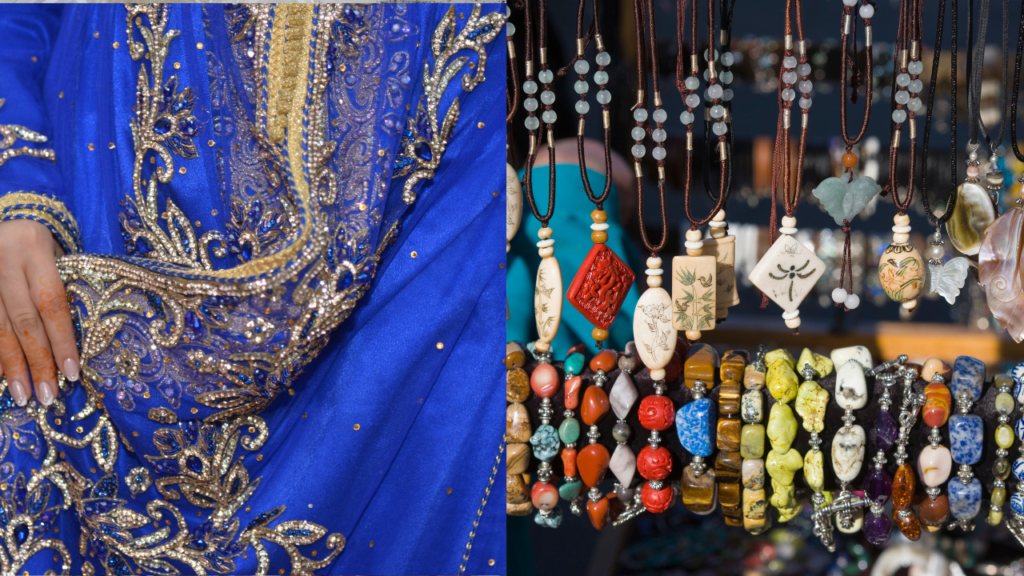
Moroccan handmade fashion and accessories offer a blend of timeless elegance and cultural symbolism. From leather goods to jewelry and traditional textiles, these creations celebrate the artistry of Moroccan artisans and allow individuals to adorn themselves with unique pieces of heritage.
Timeless Moroccan Leather Goods
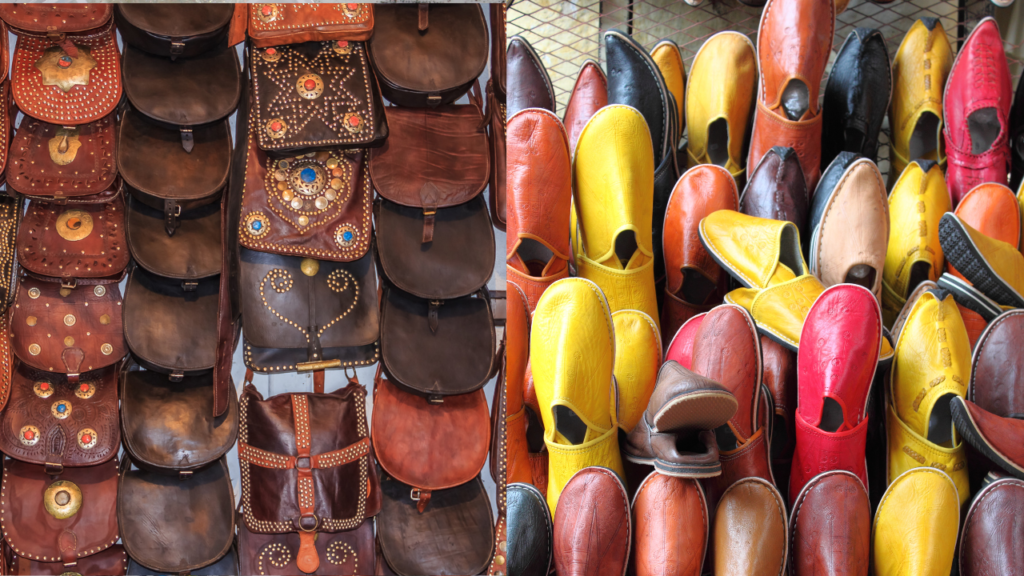
Moroccan Leather
Moroccan leather goods are renowned for their craftsmanship and quality. Skilled artisans engage in traditional tanning and crafting techniques to create durable and stylish products. Handmade bags, shoes, and belts showcase the artistry of these artisans and offer individuals the opportunity to embrace sustainable and stylish leather goods with a touch of Moroccan flair.
Jewelry and Adornments
Moroccan jewelry combines elegance and symbolism, making it the perfect accessory for those seeking to add a touch of Moroccan beauty to their outfits. Traditional techniques such as filigree and enamel work are utilized to create intricate pieces of jewelry. Crafted from precious metals and adorned with semi-precious stones, Moroccan jewelry becomes a wearable tribute to the rich cultural heritage of the country.
Regional Textile Arts and Fashion
Moroccan textile arts and fashion reflect the vibrant spirit and diversity of the country. Colorful and intricate embroidery showcases the skill of local artisans, who bring life to fabrics through their expert needlework. Traditional garments such as the caftan and djellaba embody Moroccan fashion, featuring elaborate embellishments and intricate designs. Embracing Moroccan textile arts and fashion allows individuals to celebrate and honor the heritage of this enchanting culture.
Discovering Moroccan Handmade Crafts for Everyday Use
Moroccan handmade crafts are not limited to decorative items or fashion accessories. They extend to everyday use items that showcase the marriage of functionality and artistry. From functional ceramics and tableware to artistic metalware and handwoven baskets and rugs, these creations elevate our daily experiences.
Functional Ceramics and Tableware
Moroccan ceramics and tableware offer a perfect blend of style and practicality. Stylish pottery and hand-painted designs make every meal a feast for the eyes. The exquisite craftsmanship and attention to detail transform these everyday objects into art pieces that enhance the dining experience, infusing it with Moroccan charm.
Artistic Metalware
Moroccan metalware showcases the skillful craftsmanship of artisans who utilize traditional techniques and symbolism to create pieces with artistic flair. From intricately designed trays to delicate tea sets, metalware adds an element of sophistication and beauty to any space. Incorporating Moroccan metalware into your home decor allows for a touch of artistic expression and cultural appreciation.
Handwoven Baskets and Rugs
Moroccan handwoven baskets and rugs are not only visually stunning but also highly functional. Crafted with durability in mind, these pieces serve multiple purposes, from storage to decoration. The modern designs breathe new life into traditional techniques, making them versatile additions to any space. Organizing and decorating with Moroccan rugs and baskets adds a touch of authenticity and style to your home.
Summary
Moroccan handmade products encompass a world of beauty, tradition, and cultural significance. From home decor to fashion and everyday use items, these creations embody the artistry and craftsmanship of Moroccan artisans. They contribute to local economies and communities, while also carrying the spirit of sustainability and authenticity. By embracing Moroccan handmade products, individuals support the preservation of traditional skills and heritage, creating a deeper connection to this enchanting culture.
FAQs about Moroccan Handmade Products
How can I ensure the authenticity of Moroccan handmade products?
To ensure the authenticity of Moroccan handmade products, it is essential to purchase from reputable sources. Look for certifications or labels that guarantee fair trade and ethical production practices. Additionally, authentic Moroccan handmade products often showcase unique designs, intricate detailing, and traditional craftsmanship.
Are Moroccan handmade products ethically produced?
Moroccan handmade products can be ethically produced when purchased from fair trade organizations or artisan cooperatives. These organizations ensure that artisans receive fair wages and work in safe and supportive environments. By supporting ethical consumption, individuals positively impact the lives of artisans and their communities.
Where can I purchase Moroccan handmade products internationally?
Moroccan handmade products can be purchased internationally through various avenues. Online marketplaces, fair trade stores, and specialized boutiques often offer a wide range of authentic Moroccan creations. It is essential to research and choose reliable sellers that support fair trade and ensure the authenticity of the products.
Can I learn traditional Moroccan crafts as a hobby?
Yes, learning traditional Moroccan crafts can be a fulfilling hobby. Many artisan cooperatives and cultural centers offer workshops and classes where individuals can learn techniques such as pottery, weaving, and embroidery. These experiences allow for a deeper appreciation of Moroccan crafts and the opportunity to create unique pieces of art.
Are Moroccan handmade products suitable for gifts?
Absolutely! Moroccan handmade products make excellent gifts due to their authenticity, craftsmanship, and cultural significance. From jewelry and accessories to home decor items, there is a wide range of options to suit various tastes and preferences. Gifting Moroccan handmade products not only offers a unique present but also supports artisans and their communities.
How do I care for and maintain Moroccan handmade products?
Caring for and maintaining Moroccan handmade products depends on the material and specific care instructions provided with the item. Generally, it is essential to handle these creations with care, avoiding exposure to harsh chemicals or extreme temperatures. Regular dusting, cleaning with mild solutions, and proper storage help preserve the beauty and longevity of Moroccan handmade products.
In conclusion, Moroccan handmade products capture the rich traditions, artistry, and cultural heritage of the country. From home decor to fashion and everyday items, these creations reflect the exceptional craftsmanship of Moroccan artisans. By supporting ethical consumption and embracing these unique pieces, individuals not only adorn their lives with beauty but also make a positive impact on the lives of artisans and their communities. So why not dive into the captivating world of Moroccan handmade products and discover the beauty that awaits?

